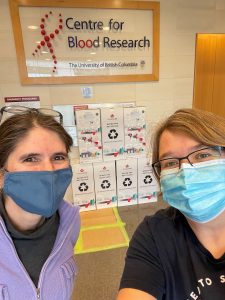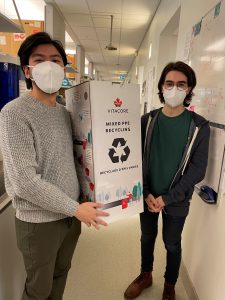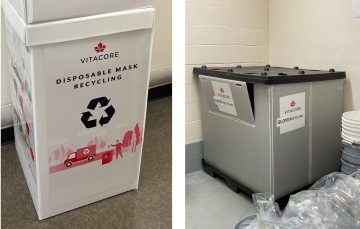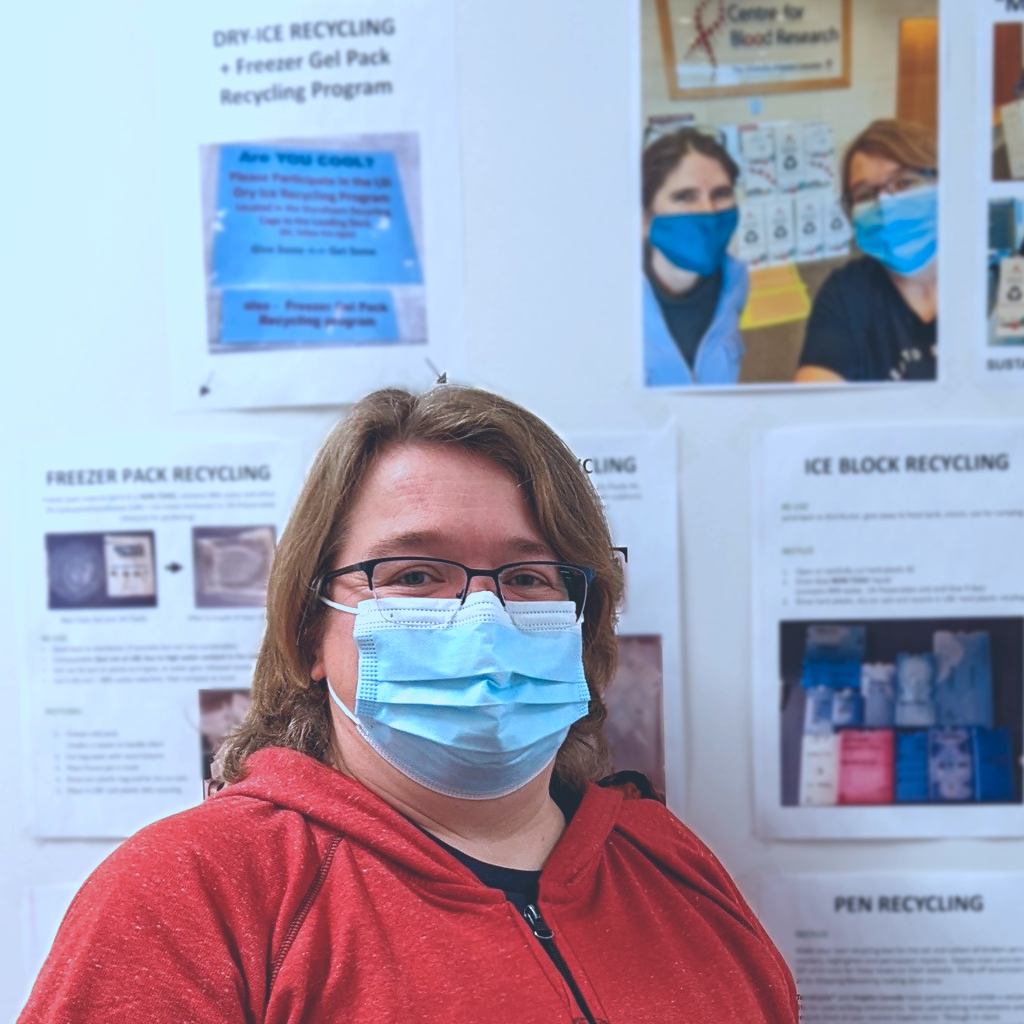Dr. Reinhild “Reini” Kappelhoff is making labs greener at UBC, one sustainability project at a time.
With $1000 from the Workplace Sustainability Fund, Reini was able to purchase 7 boxes for mask and glove recycling, which she then distributed to different Centre for Blood Research (CBR) labs.
“People were really happy to see the boxes,” said Reini, a lab manager and research associate in the Overall Lab. “They kept telling me it was a great idea, and that they wished there were more of them to go around.”
As of mid-May, Reini’s initiative has led to additional mask recycling boxes for public use and a pallet for glove recycling in the LSC basement. Learn how you can recycle your gloves and masks!

Reini Kappelhoff and Katherine Serrano with Vitacore Boxes
A timely and relevant solution
There has been a massive increase in the disposal of masks and personal protective equipment (PPE) during the COVID-19 pandemic. Between March 2020 and November 2021, it was estimated that at least 87,000 tonnes of PPE were procured globally as part of the UN’s pandemic response alone, most of which ended up as waste.[1]
Applying for funding to tackle this problem, one box at a time, was both timely and relevant for Reini.
“Gloves are the most thrown away item in the lab, and since the pandemic started, we added disposable masks too,” Reini said. “That has to do with safety measures, of course, but I began to wonder, ‘How much waste would we save from the landfill if we could just recycle them instead?’ ”
Once these boxes are full, they will be sent to a recycling company in Burnaby called Vitacore. Since the recycling company is local rather than overseas, which is the norm, the gloves and masks only have to travel a short distance before being repurposed.
Gloves will be washed, shredded, and processed into sheets or blocks of a material called nitrile butadiene rubber (NBR), which can then be used in rubber mixtures. Used masks will be repurposed into plastic pellets that are used in the construction and textile industries.
Reini is also very interested to collect data on the recycled items in the boxes, which will be provided by the company. For example, she wants to know how many gloves and masks have been diverted from the landfill, and how long it took for each box to fill up.
“We hope to make this a larger project that continues past the pilot stage,” Reini said. “This is just the first step, but I hope many more will follow.”
“I began to wonder, ‘How much waste would we save from the landfill if we could just recycle [gloves and disposable masks] instead?’ ”
— Dr. Reinhild Kappelhoff

CBR members Daniel Luo (left) and Matthew Drayton (right) promote sustainability in their lab
A long-time champion of lab sustainability
When Reini first came to UBC in 2003, paper was one of the only materials that was recycled at the time. Inspired by the robust recycling system in Germany, her home country, Reini joined the Green Labs Program in 2008 and quickly became a UBC Sustainability Coordinator, along with colleague Dr. Katherine Serrano from the Devine Lab.
Since then, the two of them have continuously advocated for better sustainability in lab spaces. Just a few of their initiatives include purchasing a dishwasher rack for sustainable glass pipette washing, thanks to Green Labs funding in 2015; compiling the LSC Recyclopedia so members are informed of different waste management policies; implementing dry ice recycling; and starting brown glass recycling last year.
As for sustainability initiatives, Reini doesn’t plan to stop after just this project. She hopes that mask and glove recycling will continue long after the pilot project is over, and spread to more labs and departments.
“It’s really important to engage people and show them that, yes, it’s possible to make our spaces more sustainable. We’re hoping to do this one box, one glove, one mask at a time.”

Left: Box for disposable mask recycling Right: Pallet for glove recycling in the LSC basement room B2.213.
As of mid-May, Reini has calculated 17.25 kg of gloves and masks in these boxes, and the Life Sciences Institute (LSI) has purchased 4 large mask recycling boxes for each of the building’s 4 main entrances, as well as a big pallet for glove recycling in the LSC basement Room B2.213.
Congratulations to Reini on spearheading this initiative that is now building-wide, and for making an impact long beyond the pilot stage!
Read more about Reni’s involvement in UBC’s Green Labs Program: “Staff, faculty and graduate students collaborate to make UBC labs greener”.
Learn how to recycle your gloves and masks.
References:
[1] World Health Organization. (n.d.). Tonnes of COVID-19 health care waste expose urgent need to improve waste management systems. World Health Organization. Retrieved from https://www.who.int/news/item/01-02-2022-tonnes-of-covid-19-health-care-waste-expose-urgent-need-to-improve-waste-management-systems
This story by Kristine Ho originally appeared on the Centre for Blood Research website.
